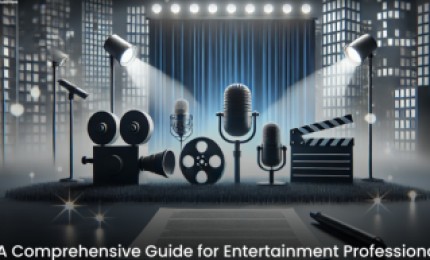Mastering Contract Negotiations: A Comprehensive Guide for Entertainment Professionals
In the fast-paced world of entertainment, your ability to negotiate contracts can make or break your career. Whether you're a seasoned performer or an up-and-coming artist, understanding the intricacies of contract negotiations is crucial. This comprehensive guide will equip you with the knowledge and strategies needed to navigate the complex landscape of entertainment contracts successfully.
I. The Foundations of Entertainment Contracts
A. Legal Framework
Entertainment contracts operate within a specific legal context. Understanding the basics of contract law, intellectual property rights, and industry-specific regulations is essential. Key areas include:
- Copyright law and its implications for creative works
- Trademark considerations for personal branding
- Labor laws affecting performers and crew members
- State-specific entertainment laws (e.g., California's Talent Agencies Act)
B. Industry Standards and Practices
Each sector of the entertainment industry has its own set of standard practices. Familiarize yourself with:
- Standard deal structures in your specific field (music, film, television, theater, etc.)
- Common royalty rates and payment structures
- Industry-specific union regulations (e.g., SAG-AFTRA, WGA, DGA)
- Typical contract terms for different career stages
II. Types of Contracts in the Entertainment Industry
A. Recording Contracts
- Major label deals vs. independent label contracts
- 360 deals: pros and cons
- Distribution agreements
- Production agreements
B. Publishing Agreements
- Traditional publishing deals
- Co-publishing agreements
- Administration agreements
- Sync licensing contracts
C. Performance Contracts
- Live performance agreements
- Touring contracts
- Residency agreements
- Festival performance contracts
D. Film and Television Contracts
- Option agreements
- Development contracts
- Production contracts
- Talent agreements (acting, directing, writing)
E. Digital Media Contracts
- Streaming platform agreements
- Social media influencer contracts
- Podcast production and distribution deals
- Virtual reality and gaming contracts
III. Key Components of Entertainment Contracts
A. Rights and Ownership
- Copyright ownership and transfers
- Licensing terms
- Territory and duration of rights
- Reversion clauses
B. Compensation Structures
- Advance payments
- Royalty calculations and accounting practices
- Profit participation
- Backend deals
C. Creative Control and Approval Rights
- Final cut privileges
- Approval over marketing materials
- Creative decision-making processes
- Collaboration and credit determinations
D. Delivery and Performance Obligations
- Project milestones and deadlines
- Quality standards and technical specifications
- Promotional commitments
- Exclusivity clauses
E. Termination and Dispute Resolution
- Breach of contract provisions
- Force majeure clauses
- Arbitration and mediation processes
- Jurisdiction and choice of law
IV. Advanced Negotiation Strategies
A. Preparation and Research
- Market analysis and comparable deals
- Understanding your leverage points
- Identifying key decision-makers
- Developing a negotiation strategy
B. Effective Communication Techniques
- Active listening and rapport building
- Framing proposals effectively
- Managing emotions during negotiations
- Overcoming language and cultural barriers
C. Creative Problem-Solving
- Identifying mutual interests
- Developing multiple options
- Using objective criteria
- Crafting win-win solutions
D. Handling Complex Negotiations
- Multi-party negotiations
- Long-term strategic partnerships
- Renegotiating existing agreements
- Navigating corporate mergers and acquisitions
V. Legal and Professional Support
A. Working with Entertainment Lawyers
- When to engage legal counsel
- Selecting the right attorney for your needs
- Cost considerations and fee structures
- Collaborating effectively with your legal team
B. The Role of Agents and Managers
- Scope of representation
- Commission structures
- Conflict of interest considerations
- Synergy between legal, management, and agency representation
C. Industry Organizations and Resources
- Professional associations and their benefits
- Continuing education opportunities
- Networking events and conferences
- Online resources and industry publications
VI. Emerging Trends and Future Considerations
A. Impact of Technology on Contracts
- Blockchain and smart contracts
- AI-assisted contract analysis
- Digital rights management innovations
- Virtual and augmented reality considerations
B. Globalization of Entertainment Markets
- International co-production agreements
- Cross-border licensing challenges
- Cultural sensitivities in global negotiations
- Navigating different legal systems
C. Evolving Business Models
- Direct-to-consumer platforms
- Subscription-based services
- Crowdfunding and fan-engagement models
- Integration of e-commerce and entertainment
D. Ethical Considerations in Negotiations
- Diversity and inclusion clauses
- Sustainability and social responsibility provisions
- Mental health and well-being considerations
- Ethical data use and privacy protections
VII. Case Studies and Practical Applications
A. Music Industry
- Analysis of a major label recording contract
- Indie artist's journey through DIY distribution deals
- Negotiating a high-profile sync licensing agreement
- Structuring a 360 deal for an emerging artist
B. Film and Television
- Negotiating a first-look deal with a studio
- Structuring backend compensation for a hit TV series
- Navigating option renewals for a book adaptation
- Crafting a multi-project deal for an A-list director
C. Digital Media
- Influencer marketing contract breakdown
- Podcast network distribution negotiation
- Esports player contract analysis
- Virtual concert licensing and revenue sharing
VIII. Conclusion: Empowering Your Career Through Effective Negotiations
Mastering the art of contract negotiations is an ongoing process that requires continuous learning and adaptation. By understanding the legal landscape, industry standards, and advanced negotiation techniques, you can position yourself for long-term success in the entertainment industry.
Remember that each contract is not just a legal document, but a strategic tool that can shape your career trajectory. Approach negotiations with a clear vision of your goals, a deep understanding of your value, and a willingness to collaborate creatively.
As you navigate the complex world of entertainment contracts, stay informed about industry trends, build strong professional relationships, and don't hesitate to seek expert advice when needed. With the right knowledge and approach, you can turn contract negotiations into opportunities for growth, innovation, and artistic fulfillment.
Your talent brought you into the entertainment industry; let your negotiation skills ensure that you thrive in it. The stage is set, the spotlight is on you – now go forth and negotiate your path to success.


.jpg)
.jpg)

